Iran Cuts Consumer Gasoline Quota As Possible Move To Raise Prices
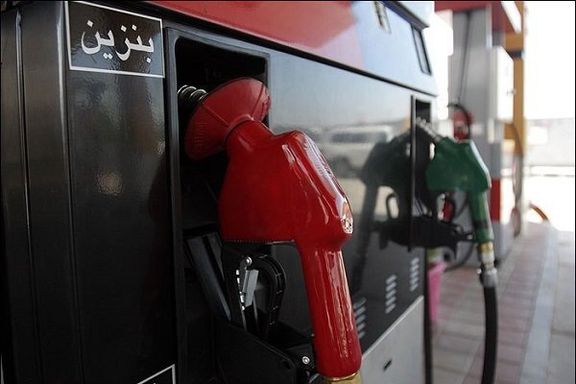
Iran has reduced 100 liters of monthly gasoline quota in personal fuel cards from 250 liters to 150 liters, a deputy oil minister has announced.

Iran has reduced 100 liters of monthly gasoline quota in personal fuel cards from 250 liters to 150 liters, a deputy oil minister has announced.
On the sidelines of a ceremony for a national project to export liquefied gas via sea on Tuesday, the head of National Iranian Oil Refining and Distribution Company (NIORDC), Jalil Salari, said that the quota of 250 liters was "a very high number" considering that fact that most Iranians do not consume that much petrol per month.
All Iranians who own a car have a 60-liter quota of gasoline at the heavily subsidized rate of about five US cents a liter, but were also allowed to buy 250 liters more at about 10 cents, which is again heavily subsidized, at about 37 cents a US gallon.
According to Jalili the new quota system will be implemented throughout the country soon.
Some people in social media have described the move as a prelude by the administration of Ebrahim Raisi to increase the price of gasoline, despite repeated announcements by the government that the price of gasoline would not increase in the current Iranian year, which started on March 21. Such a plan had been earlier piloted in Sistan and Baluchistan province, leading to a whopping rise of gasoline prices to about 150,000 rials – or about 50 cent a liter – in the black market.
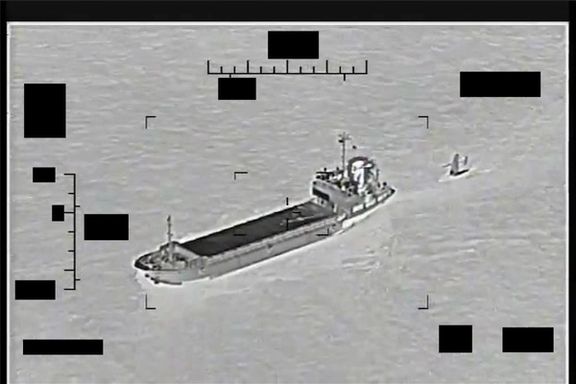
The US Navy has prevented a support ship from Iran’s Revolutionary Guard’s Navy from capturing an unmanned vessel operated by the US 5th Fleet in the Persian Gulf.
According to a statement by US Naval Forces Central Command on Tuesday, the 5th Fleet observed an IRGC support ship, named Shahid Baziar, towing a Saildrone Explorer unmanned surface vessel (USV) in an attempt to detain it while transiting international waters on Monday night local time, August 29.
The Navy patrol coastal ship USS Thunderbolt (PC 12), which was operating nearby, immediately responded and an MH-60S Sea Hawk from Helicopter Sea Combat Squadron 26 -- based in Bahrain was also launched, prompting the IRGC vessel to disconnect the towing line to the USV and depart the area approximately four hours later. The US Navy resumed operations without further incident, the statement added.
Describing the actions by the IRGC Navy as “flagrant, unwarranted and inconsistent with the behavior of a professional maritime force,” the commander of US Naval Forces Central Command, the 5th Fleet and Combined Maritime Forces, Vice Adm. Brad Cooper said, “US naval forces remain vigilant and will continue to fly, sail and operate anywhere international law allows while promoting rules-based international order throughout the region.”
The statement said the Saildrone Explorer USV that the IRGC attempted to steal is a US government property and equipped with sensors, radars and cameras for navigation and data collection, the statement said, noting that this technology does not store sensitive or classified information.
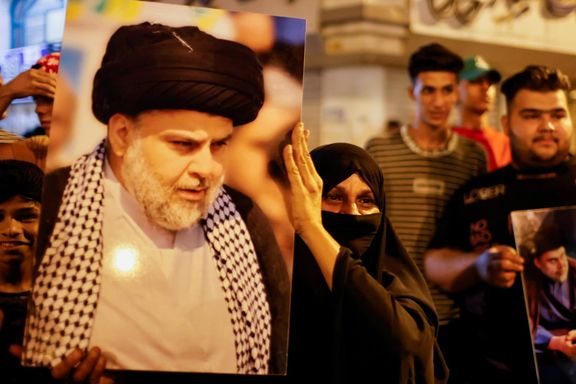
Relative calm has been restored in Iraq after influential Shia cleric Muqtada al-Sadr urged all his supporters to leave the streets following a day of violent clashes that killed about 30 people.
Iran, which had closed its border and halted flights to its neighboring country, announced on Tuesday afternoon that Mehran, Qasr-e Shirin and Chazabeh land border crossings have been reopened, but urged citizens to remain cautious amid a fragile calm.
Clashes continued until Tuesday noon between the Sadrist forces with Iran-backed militia groups in major cities as well as near the Green Zone in central Baghdad -- home to embassies and government buildings -- before the cleric asked his supporters to stop the protests.
"I still believe that my supporters are disciplined and obedient. And if in the next 60 minutes they do not withdraw, as well as from parliament, then I will abandon these supporters," he said. Following the announcement, supporters began leaving central Baghdad on vehicles, holding rifles and chanting while driving away.
He apologized to the Iraqi people and said shedding the blood of an Iraqi is Haram (forbidden), noting that “I expected the protests to remain peaceful, but I don't want even peaceful protests any more... Had we dissolved armed groups, we wouldn't be witnessing the current situation.”
Iraqi Prime Minister Mustafa al-Kadhimi praised Muqtada al-Sadr over his call for cessation of conflicts, and urged immediate dialogue among political groups.
The unrest initially broke out on Monday, August 29, hours after Sadr announced he was quitting politics.
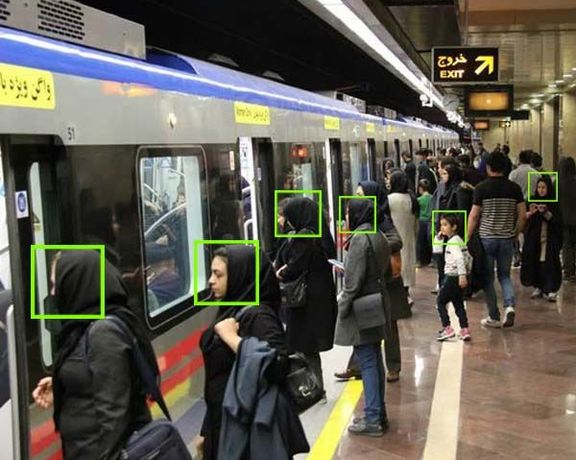
Iran is about to start using cameras in the metro to track and identify women who do not observe the compulsory Islamic dress code – or hijab.
Mohammad Saleh Hashemi Golpayegani, the secretary of Iran’s Headquarters For Enjoining Right And Forbidding Evil, tasked with promoting the clerical regime’s interpretation of Islamic morals, confirmed the move in an interview published on Tuesday, adding that the subway CCTV cameras are programed to use face recognition technology to take a photo of the unveiled women.
He added that the photos will be matched against the database registered for the women’s national ID cards to identify them and then a ticket with a significant fine will be sent to them.
Golpayegani had previously said that about half of the Iranian women currently do not observe the mandatory hijab rules.
In recent months the Islamic Republic’s government and security agencies have intensified their efforts to pressure women into abiding by the hijab laws and several rounds of anti-hijab civil disobedience campaigns followed. The patrols by the “morality police” have increased on the streets and videos of violent arrests of women and girls as well as confrontations between people and hijab enforcers are surfacing on social media every day.
Authorities are hailing those who harass women for their insufficient hijab and security forces stepped up detention of women in the streets for their loose hijab.
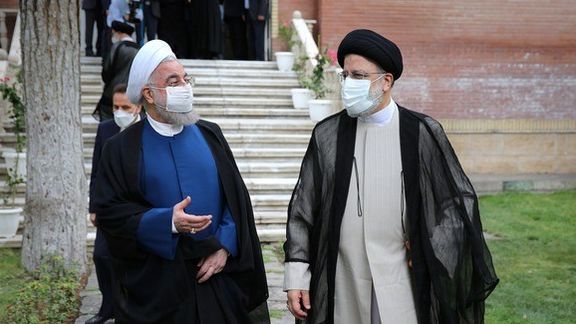
Disclosures about a $3 billion corruption case at one of Iran's biggest steel plants, has put the governing hardliners in the center of the embarrassing case.
While conservative camp thought the disclosure would discredit the ‘Reformist’ government, the details of the case have affected the reputation of many of its figureheads, including clerics.
In a belated report on the case, IRGC-linked Fars news agency tried to cover up the corruption case at Mobarakeh Steel Company (MSC), claiming that a major part of the figure involved is about the difference in the price of steel at different times. The report further claimed that Iran International and BBC Persian have been putting gasoline on the fire to disturb the Iranian public's mind.
Moderate news website Rouydad24 observed in a report that hardliners at the Iranian parliament initially launched the investigation and published the results to discredit the reformists.
Rouydad24 said in the report that "The hardliners in parliament who disclosed the corruption case never thought that anyone would read a 300-page report to find out about the damning details. They thought people would only listen to their rhetoric about the case."
But social media activists published a ten-page document including the names of tens of Iranian hardliners and individuals and organizations linked to them who had received hefty sums from the Steel Plant. These included many media outlets, such as news agencies, newspapers, websites and even the state television that operates under the supervision of Supreme Leader Ali Khamenei.
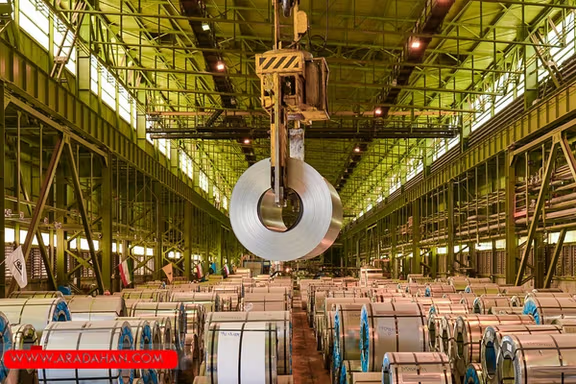
Reports also indicate that several social media influencers were also paid possibly to turn a blind eye to the illegal payments by the MSP. Saba Azarpeik, a whistle blower on social media later said that she was offered large sums of money to stop writing about the case.
When the disclosure backfired, it was revealed that many Friday prayer imams were paid by the steel plant. None was seen to refute the reports. Also, newspapers such as the IRGC-linked Javan and Khamenei-linked Kayhan did not try to deny having received money from the MSC. Those who issued denials in the reform camp included a newspaper publisher who said he had received hundreds of billions of rials (tens of thousands of dollars) for writing only three articles about the steel plant.
According to Rouydad24, even some of the lawmakers involved in the investigation were themselves implicated in the corruption case.
The Majles (parliament) that had initially ordered, conducted and published the results of the investigation tried to distance itself from the matter and sent the case to the Judiciary for further investigation.
Iran's Chief Justice Gholamhossein Mohseni Ejei said subsequently that a special court and a special prosecutor have been tasked to launch an investigation into the case. However, no further action seems to have been taken, at least in public, to address the concerns, other than President Ebrahim Raisi's order to fire the MSC managers who violated the law.
To explain the magnitude of the money involved in the case, 3.5 billion dollars, some Iranian social media users reminded that Elon Musk's investment on the Spex project this year was $2 billion.A study conducted by social media researcher Mohammad Rahbari said some 17,000 tweets in Persian were posted by Iranians on the MSC corruption case in less than one week, adding that half of "liked" posts were those that criticized the government and reiterated that Iran was plagued by systematic corruption.
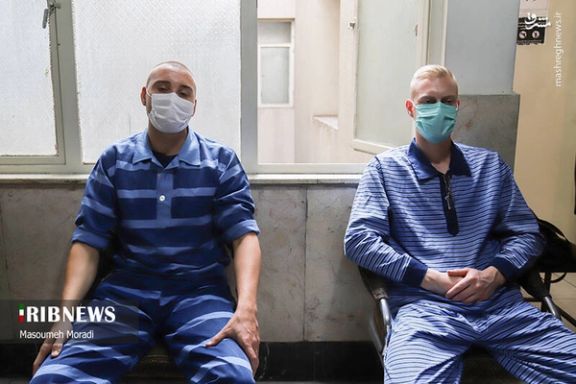
An Iranian court has sentenced two Swedish citizens to eight and five years imprisonment and lashes for drug trafficking.
During a weekly press conference on Tuesday, Judiciary spokesperson Masoud Setayeshi said the two, identified as Stephen Kevin Gilbert and Simon Kasper Brown, were arrested in January 2020 at an airport in Tehran as they were about to leave the country with large quantities of opium-based narcotics.
"Simon Kasper Brown was sentenced to five years in prison and a fine of about 10 billion rials (about $34,000) for transporting more than 21,000 illegal pills of tramadol," an opioid painkiller, and "Stephen Kevin Gilbert was sentenced to eight years in prison, 60 lashes and a fine, for being in possession of 9.8 kilograms (21 pounds) of opium resin," he said.
The trial of the men — accused of being part of an “international drug trafficking gang” — opened in September 2021. Iran is a key smuggling route for opium and heroin from neighboring Afghanistan, the world’s largest producer.
The judiciary spokesman noted that the case of the pair is different from the Swedish man arrested in July on allegations of “espionage,” whose case is being investigated but his identity has not been revealed.
Tensions are relatively high between Tehran and Stockholm over a Swedish court’s sentencing of former Iranian jailor Hamid Nouri to life imprisonment over executions of political prisoners in 1988.
Earlier in the month, Sweden started planning for the prosecution of two Iranian-Swedish brothers who were arrested in 2021 over allegations of espionage for Iranian Intelligence organizations.